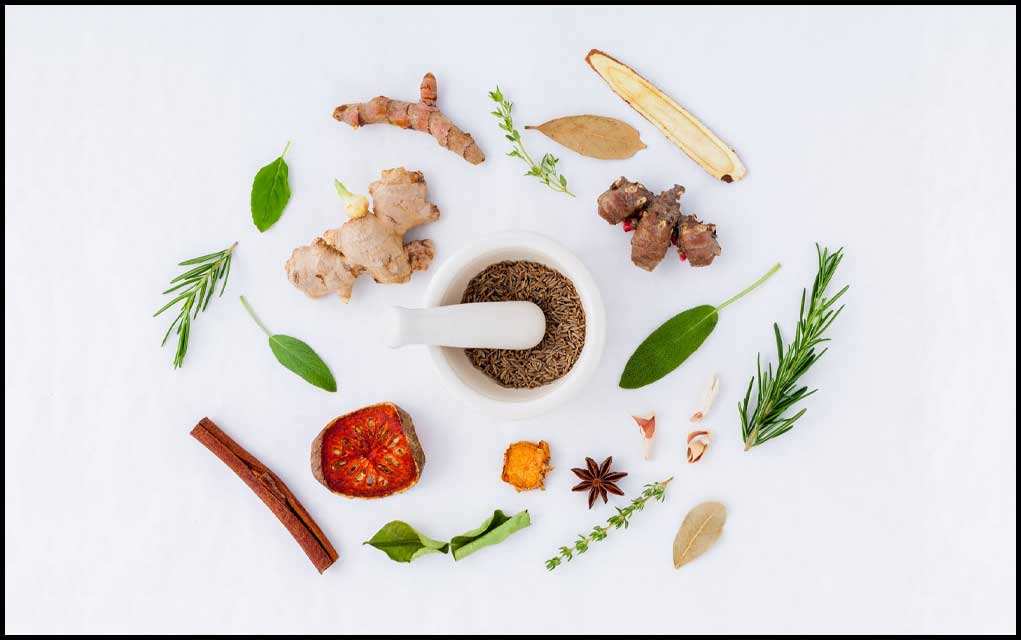They may have an impact on your symptoms and thyroid test results
Like many things, some people are looking for natural alternatives to thyroid hormone replacement or anti-thyroid treatment. While there are no herbs that have thyroid hormones in them, there have been studies evaluating herbs as alternatives or add-ons to thyroid medication.
For the most part, if you do not have a nutritional deficiency, herbs and supplements will not resolve your thyroid condition—and some may cause serious health problems. However, some herbal supplements may help optimize your thyroid function by interacting with the hormones that are already present in your body.
If you are looking into herbal treatments, keep in mind that the effects they have on one type of thyroid disease are not likely to be the same for all types of thyroid disease.
Prevention
Chamomile, sage, and mountain tea have all been associated with a decrease in benign and malignant thyroid disease, and this effect appears to be the strongest for chamomile tea. In one study published in 2015, consuming between two to six cups of these types of herbal tea per week was associated with a reduced incidence of thyroid disease. The reason for this association is not clear, however.1
Green tea, interestingly, has been associated with a lower incidence of thyroid disease in some people, but a higher incidence of thyroid disease in others.
Subclinical Hypothyroidism
Subclinical hypothyroidism is characterized by low thyroid hormones levels without symptoms.
Ashwagandha, also referred to as Withania somnifera and Indian ginseng, is derived from a nightshade plant. It is a traditional medicine used in Ayurveda practice that comes in capsule and powder form. At an average dose of 600 mg per day, it has been shown to reduce thyroid hormone abnormalities in subclinical hypothyroidism in a few small human studies.2
It is important to note that ashwagandha can trigger a severe form of hyperthyroidism known as thyrotoxicosis.
Hyperthyroidism (incl. Graves’ Disease)
Hyperthyroidism is excessive thyroid hormone activity. Lycopus europaeus, also known as bugleweed, is an herb that has been shown to help reduce the symptoms of mild hyperthyroidism in human studies published 2013.3 It may also reduce the symptoms of Graves’ disease, an autoimmune type of hyperthyroidism.
Bugleweed is believed to act against the antibodies that cause Graves’ disease, but it is not clear why it may reduce symptoms of hyperthyroidism even if you do not have this particular type. It comes as a liquid and a pill, and while it has been well-tolerated in human studies, the ideal dose is not established.
In addition, a combination of Yingliu mixture and methimazole has been used for the treatment of Graves’ disease in China. Methimazole is antithyroid medication, and Yingliu mixture is a preparation of oysters, white mustard seed, and a variety of herbs and plants.
A number of studies that used a Yingliu mixture prepared in a laboratory have been carried out in China. Results consistently showed that clinical symptoms and thyroid tests were better with the combination than with the methimazole alone.4
Thyroid Tumors
There are many types of thyroid tumors, and some can be quite aggressive, requiring surgery, chemotherapy, and radiation treatment. Fucoidan, which is isolated from the Fucus vesiculosus seaweed plant, has been shown to help control the growth of thyroid tumor cells in a laboratory setting since 2017. It is not clear whether this will work in preventing thyroid tumor growth in humans.5
Goiter
A goiter is an enlarged thyroid gland. It can be a sign of hyperthyroidism, hyperthyroidism, or a thyroid tumor. Several herbs used to treat thyroid disease in traditional Chinese medicine, including Thallus Sargassi Pallidi (HZ) and Radix Glycyrrhizae (GC), contain Haizao Yuhu Decoction (HYD), an herb that has been shown to reduce the size of goiter in rat studies published in 2016.6
Iodine Deficiency
Your body needs iodine, an essential mineral, to produce thyroid hormones. Those who are deficient may be advised to increase iodine through diet or supplementation.
There are several types of iodine supplements, including a preparation described as “reduction of 131I,” which is made of dried seaweed and other herbs and plants.
While restoring too-low iodine levels is important to thyroid function, such deficiency is very uncommon in the United States and you must be careful about over-consuming iodine either inadvertently or with the best of intentions.
Excessive levels of iodine can cause thyroid disease.7 They have also been shown to induce hypothyroidism in some people and hyperthyroidism in others. As such, it is best to approach taking iodine-containing herbs and supplements with caution and under the guidance of a healthcare professional.
Iodine is an element found in seafood and dairy products and, in the United States, standard table salt and fortified foods. For that reason, it is rare for someone living in America to develop thyroid problems related to an iodine deficiency.
A Word From Verywell
Thyroid disease is a lifelong condition and the idea of herbal therapy can sound like a safe way to control your condition and your symptoms. At the current time, herbal remedies have only been found to be marginally effective in altering thyroid function.
As you consider herbal treatments for any medical condition, including thyroid disease, be wary of claims that any product can “balance” your system. With thyroid disease, the effects of “too high or too low” are both problematic, and there is not a natural therapy that can simultaneously address both conditions.
Important Notice: This article was originally published at www.verywellhealth.com by Mary Shomon where all credits are due. Medically reviewed by Do-Eun Lee, MD.
Disclaimer
The watching, interacting, and participation of any kind with anything on this page does not constitute or initiate a doctor-patient relationship with Dr. Farrah®. None of the statements here have been evaluated by the Food and Drug Administration (FDA). The products of Dr. Farrah® are not intended to diagnose, treat, cure, or prevent any disease. The information being provided should only be considered for education and entertainment purposes only. If you feel that anything you see or hear may be of value to you on this page or on any other medium of any kind associated with, showing, or quoting anything relating to Dr. Farrah® in any way at any time, you are encouraged to and agree to consult with a licensed healthcare professional in your area to discuss it. If you feel that you’re having a healthcare emergency, seek medical attention immediately. The views expressed here are simply either the views and opinions of Dr. Farrah® or others appearing and are protected under the first amendment.
Dr. Farrah® is a highly experienced Licensed Medical Doctor certified in evidence-based clinical nutrition, not some enthusiast, formulator, or medium promoting the wild and unrestrained use of nutrition products for health issues without clinical experience and scientific evidence of therapeutic benefit. Dr. Farrah® has personally and keenly studied everything she recommends, and more importantly, she’s closely observed the reactions and results in a clinical setting countless times over the course of her career involving the treatment of over 150,000 patients.
Dr. Farrah® promotes evidence-based natural approaches to health, which means integrating her individual scientific and clinical expertise with the best available external clinical evidence from systematic research. By individual clinical expertise, I refer to the proficiency and judgment that individual clinicians acquire through clinical experience and clinical practice.
Dr. Farrah® does not make any representation or warranties with respect to the accuracy, applicability, fitness, or completeness of any multimedia content provided. Dr. Farrah® does not warrant the performance, effectiveness, or applicability of any sites listed, linked, or referenced to, in, or by any multimedia content.
To be clear, the multimedia content is not intended to be a substitute for professional medical advice, diagnosis, or treatment. Always seek the advice of your physician or other qualified health providers with any questions you may have regarding a medical condition. Never disregard professional medical advice or delay in seeking it because of something you have read or seen in any website, video, image, or media of any kind. Dr. Farrah® hereby disclaims any and all liability to any party for any direct, indirect, implied, punitive, special, incidental, or other consequential damages arising directly or indirectly from any use of the content, which is provided as is, and without warranties.









